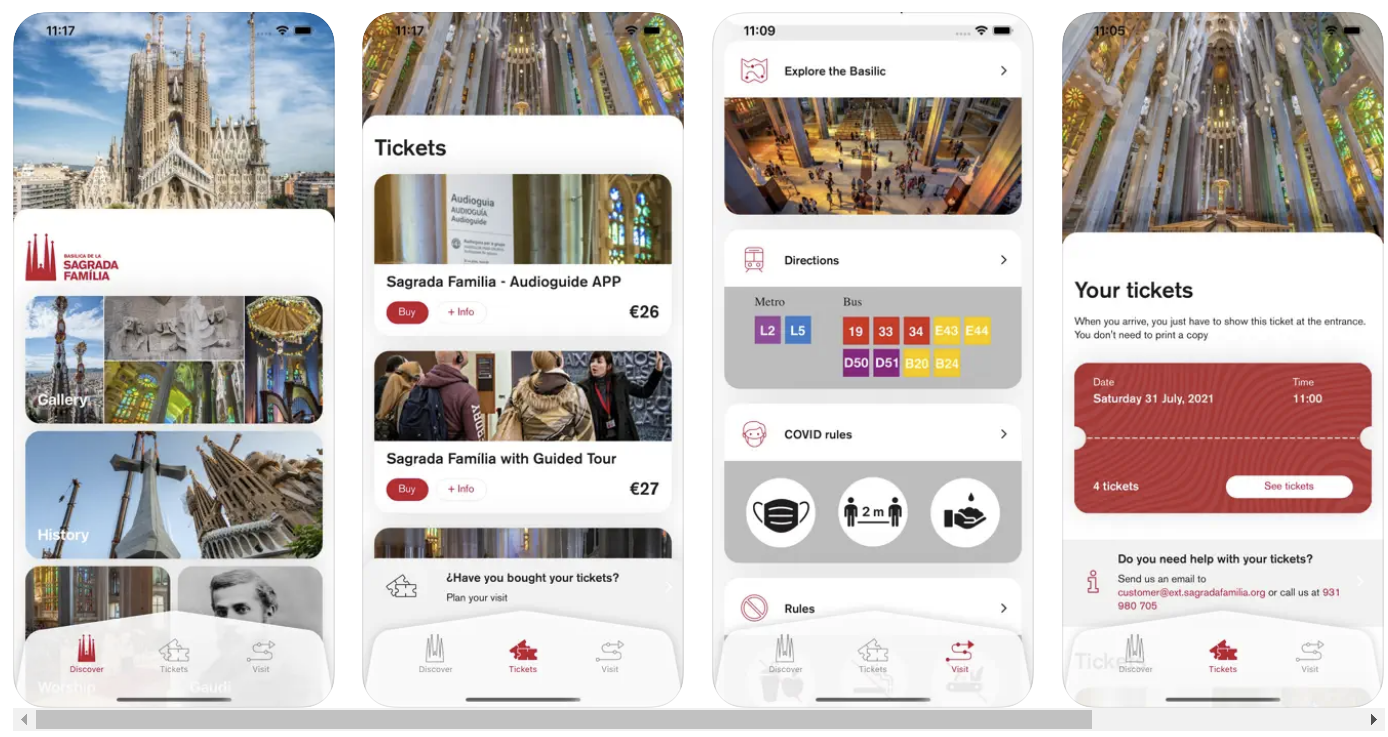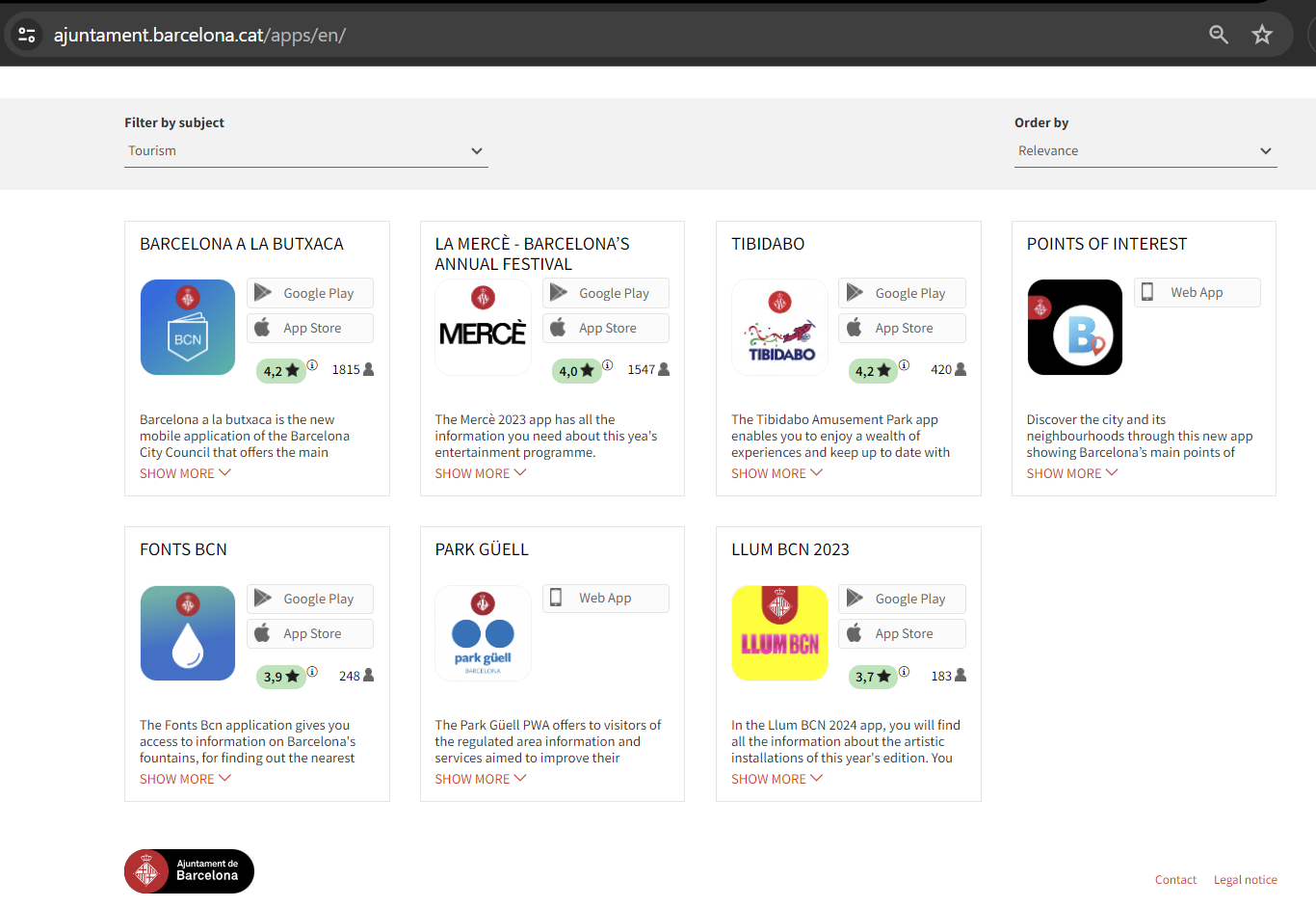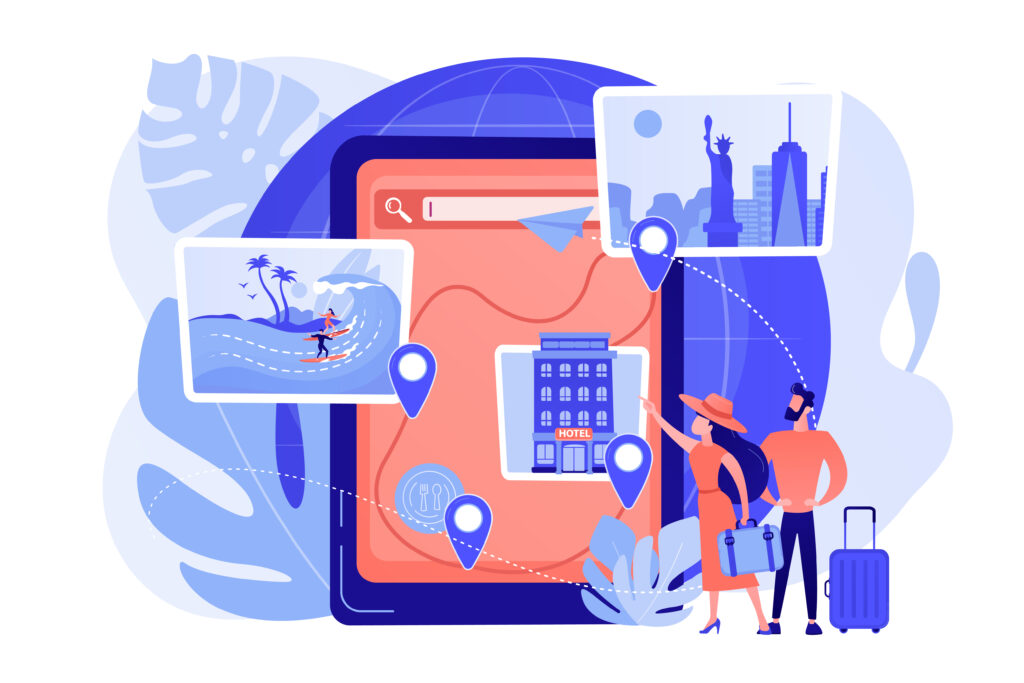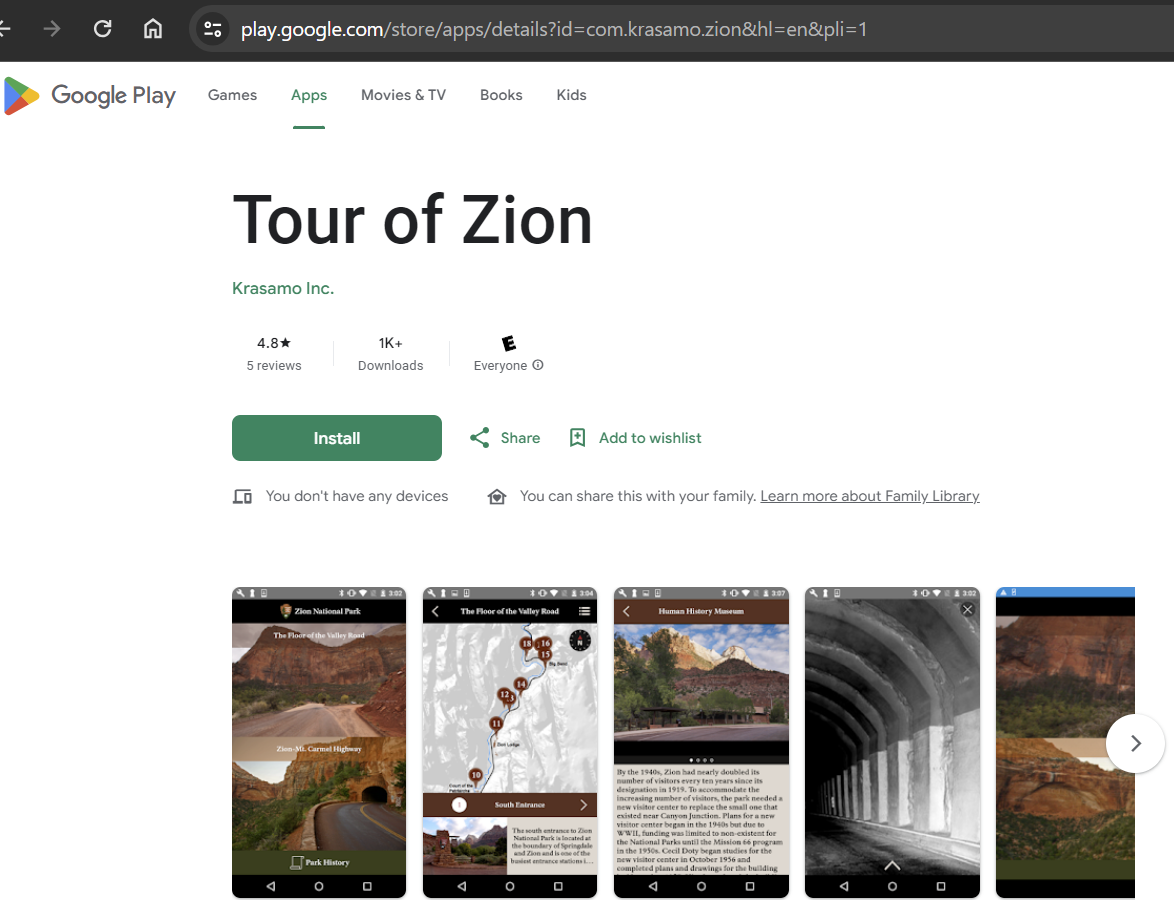Table of content
- Unlocking the Potential of Tour Apps in the Digital Travel Landscape
- Tour Guide Apps: Elevating Travel Experiences with Technology
- Features of Tour Guide Apps
- The Role of Large Language Models (LLMs) in Advancing Tour Guide App Development
- Other Travel Apps
- Smart Cities’ Contribution to the App Economy
- Tour Guide App Development in 2024
The travel app industry is growing rapidly. Like many other industries, it is undergoing digitalization. Mobile trends indicate that mobile apps will grow significantly in the next ten years.
Current estimates by Statista, for example, put the global travel app market revenue at a higher figure, reaching 2 billion U.S. dollars by 2027. Within this sector, tour apps emerge as a prominent sub-category.
Artificial intelligence is expected to disrupt this market with the introduction of large language models (LLMs) and the rise of AI for trip planning.
This page is part of our mobile app development series for businesses looking to create an app. It covers relevant aspects when building a tour guide app for your business.
Drawing from 14 years of mobile app development experience, including expertise in geofencing, IoT development, and the creation of a national park app, Krasamo possesses a wealth of knowledge perfectly tailored to address a wide range of use cases, encompassing tour guide apps, audio tour apps, shopping mall apps, and various other categories within the realm of travel apps.
Unlocking the Potential of Tour Apps in the Digital Travel Landscape
Tourist destinations worldwide have embraced the concept of tour apps, and the potential within this space remains abundant. Mobile apps, in particular, serve as strategic marketing tools capable of crafting unforgettable experiences that foster customer engagement and brand recognition and generate substantial revenue streams.
Tour apps are a unique opportunity to deliver timely, location-specific, and user-centric content in a world saturated with information. They serve as a bridge to connect with other contributors in the tourist ecosystem, paving the way for the creation of innovative services.
Whether a guided tour app or a city tour app, these platforms typically kickstart their journey with walking tours and audio guides. However, they open diverse monetization avenues, including in-app purchases, advertising, coupons, etc. Discover the captivating prospects within the app economy and explore the development of immersive digital products catering to large or niche travel companies.
Tour Guide Apps: Elevating Travel Experiences with Technology
Tour guide apps are mobile applications meticulously designed to enrich users’ exploration of diverse destinations, encompassing cities, museums, historical sites, and natural wonders.
These digital companions harness cutting-edge technology to elevate the tourist experience, offering diverse features and functionalities. Here’s a concise breakdown of how these tour guide apps operate:
Content Creation Journey:
- Gathering Information: Creating an app entails comprehensive research and data collection about the destination. This includes historical insights, captivating trivia, noteworthy points of interest, interactive maps, and multimedia content like vivid images and engaging videos.
- Content Curation: Information is meticulously organized and structured within a database, thoughtfully categorized by location, theme, or relevance. The goal is to construct a comprehensive and captivating guide that resonates with users.
User Interface (UI) Design:
- Designing the App: A team of UI/UX designers and developers meticulously designs an intuitive and user-centric interface, ensuring seamless navigation and easy access to information.
- Maps and Navigation: Many apps seamlessly integrate mapping and navigation features, simplifying users’ ability to easily travel across unfamiliar destinations and pinpoint specific points of interest.
GPS and Location Services:
- Leveraging GPS: Many tour guide apps continuously use GPS technology to track users’ real-time locations, providing context-aware information and step-by-step directions.
- Geofencing: Geofencing technology is adeptly employed to trigger relevant notifications or content when users enter predefined areas or approach specific points of interest.
User Engagement:
- Search and Browse: Users can employ search functionalities to pinpoint particular locations or topics of interest within the app. Alternatively, they can explore pre-designed tours and routes for inspiration.
- Multimedia Immersion: Engaging multimedia elements, such as descriptive texts, narrated audio guides, striking images, captivating videos, and even immersive augmented reality experiences, enrich users’ understanding and appreciation of the locale.
- Community Reviews and Ratings: The app encourages user-generated content, reviews, and ratings, facilitating informed decision-making for fellow explorers.
Personalization:
- Tailored Experiences: Certain tour guide apps go the extra mile by providing personalized recommendations guided by users’ interests, current location, and past interactions within the app.
- Favorites and Itineraries: Users can craft personalized itineraries, bookmark their preferred destinations, and meticulously plan their journeys according to their unique preferences.
Offline Accessibility:
- Downloadable Resources: Recognizing the need to accommodate travelers venturing into areas with limited or no internet connectivity, select tour guide apps offer the option to download essential content and maps for seamless offline access.
Monetization Strategies:
- Diverse Pricing Models: Tour guide apps may adopt various pricing models, including free access with revenue streams from in-app advertisements, freemium models, or one-time purchases. In addition, some apps engage in strategic partnerships with local businesses for sponsorship or promotional opportunities.
Ongoing Maintenance and Updates:
- Keeping Information Current: To uphold the integrity of the user experience, developers diligently maintain their apps by consistently introducing updates. These updates incorporate new attractions, real-time event information, and modifications to existing locations. This unwavering commitment ensures users access the most up-to-date and relevant information, enhancing their travel experiences.
Tour guide apps seamlessly blend various elements such as information, GPS technology, multimedia content, and user-friendly interfaces to elevate the travel experience, offering users informative and interactive guides to diverse destinations. These apps continually evolve to incorporate innovative features that cater to travelers’ diverse needs and preferences.
One of the key advantages of tour guide apps is the flexibility they offer. They enable self-guided tours, whether walking, driving, or cycling, allowing you to explore at your own pace while saving on guided tour expenses.
Tour guide apps are a treasure trove of local knowledge, providing information on attractions, restaurants, events, and more. They excel in local discovery and recommendations, offering themed tours and routes focused on architecture, design, food, museums, and more. Historical and modern photos, archival videos, and images seamlessly enrich these tours, providing users with a rich visual experience.
Privacy-conscious users need not worry; tour guide apps only gather contextual and behavioral data with user consent. This data helps tailor hyper-personalized and location-aware travel experiences. While user identities aren’t linked, real-time GPS coordinates, mode of transport, content interactions, travel history, preferences, and navigation data may be collected to understand usage patterns and optimize tours.
Among the standout features of tour guide apps are audio tours, often referred to as audio tour apps. These apps function like podcasts that move with the user, allowing you to immerse yourself in the exploration area without constantly staring at your phone. Audio apps automatically provide location-based narrations about points of interest, guiding you through the tour.
In addition to audio tours, tour guide apps offer walking tours, earning them the title of ‘walking tour apps’ or ‘city walk apps.’ They empower users to embark on self-guided walking tours at their own pace, offering insights into a city’s secrets and serving as your guide.
City tour apps delve into a city’s historic walks, iconic skyscrapers, delectable street food, and captivating storytelling. Furthermore, they seamlessly integrate with other apps and tour service providers to enhance your travel experience.
Driving tours, often featuring audio tour guides, are another facet of tour guide apps. These tours are triggered by your phone’s GPS coordinates, delivering relevant stories, tips, and directions. Some apps can even integrate with popular navigation tools like Google Maps.
Within tour guide apps, you’ll find specialized options catering to various interests, including food and dining apps, national park apps, museum apps, bike tour apps, and more. Below are some examples of tour guide apps to explore:
These apps exemplify the transformative power of technology in enhancing travel experiences, making your journeys more immersive and informative.

Features of Tour Guide Apps
- Tour schedules: Tour guide apps offer pre-set tours with scheduled start times, allowing users to book in advance. The app provides timely alerts for upcoming stops on the tour, ensuring a well-organized and seamless experience.
- Push notifications: These apps utilize contextual push notifications to highlight nearby attractions and deliver quick facts based on the user’s location. This feature enhances real-time engagement and keeps travelers informed about points of interest.
- Ratings and reviews: To foster user engagement and improve the overall quality of tours, tour guide apps enable users to rate points of interest and leave reviews. These user-generated insights play a vital role in enhancing future recommendations.
- Geofencing: Tour guide apps employ geofencing technology to create virtual perimeters. Additional tour content is automatically unlocked and displayed when users enter specific areas. This feature enhances the depth of the tour experience, especially when combined with beacons for indoor tours.
- Navigation and Maps capabilities: Tour guide apps excel in navigation, guiding users seamlessly from one location to the next. They display the user’s current location and offer walking routes for easy navigation between tour stops and points of interest. Some apps even provide turn-by-turn navigation, ensuring travelers can explore with confidence. Moreover, these apps can connect with GPS navigation apps to help users navigate roads, discover directions, avoid traffic, and explore additional points of interest.
- Interactive Elements: Tour guide apps take engagement to the next level with interactive elements such as scavenger hunts and virtual tours (VR). These features add an exciting dimension to the user experience, making tours more interactive and enjoyable.
- Artificial Intelligence: Tour guide apps harness the power of Artificial Intelligence (AI) to provide a dynamic and informative experience. AI can generate text-based answers, offer translations, provide summarizations of content, facilitate natural conversations with users through chatbots, deliver audio content, and much more.
The Role of Large Language Models (LLMs) in Advancing Tour Guide App Development
LLMs (large language models) like GPT-3 can potentially play several useful roles in the development of tour guide apps:
- Generate script content – LLMs can help write compelling, human-like audio tour scripts and narratives tailored to specific locations. Their capabilities for natural language generation make them well-suited for creating scripts.
- Translate content – The models can automate the translation of audio tour content into multiple languages, enabling easy localization (locally adapted) and expansion into new markets.
- Summarize research – LLMs can digest travel research, guides, and information to summarize key points and identify relevant facts to include in tour narratives.
- Voice synthesis – Some models can synthesize natural, human-like voiceovers for audio tours from scripts. This automates audio production.
- Chatbot conversations – LLMs can power conversational chatbot features to answer tourist questions, recommend sites, provide trip planning help, etc.
- Optimize tours – Given user behavior, ratings, and usage data, LLMs could learn to optimize and improve tours for relevance, accuracy, and engagement.
- Personalized content – Models can help generate customized tour content and recommendations tailored to user interests and profiles.
- Multimodal applications – LLMs may support the generation of related visuals, photos, and videos to enhance multimodal tours.
LLMs are promising for automating and enhancing many aspects of tour guide app creation, from writing to conversation to personalization, reducing overall development time and costs. Their integration is an impactful application of AI in travel technology.
Other Travel Apps
On average, travelers use 6- 8 apps throughout their travel journey. According to the businessofapps.com travel Apps report, more than 800 million people used a travel app in 2022.
Although our focus is on developing the above-related apps related to travel, other travel apps cater to different aspects of the travel experience. When brainstorming travel app ideas, you can check the following travel app types travelers use.
- Online Travel Agencies (OTA) – Booking and Reservation Apps
- Flight Booking Apps
- Hotel Booking Apps
- Transportation Apps (lagging in modernization)
- Airlines
- Cruise Lines
- Car Rental
- Ride-Sharing Apps
- Public Transportation Apps
- Subway map apps
- Taxi apps
- Navigation and Maps Apps
- GPS Navigation Apps
- Offline Maps
- Accommodation Sharing Apps
- Hotels
- Home-Sharing Apps
- Couchsurfing
- Travel Planning and Organization Apps
- Trip Planning Apps
- Currency Conversion Apps
- Language and Translation Apps
- Translation Apps
- Language Learning Apps
- Weather and Climate Apps
- Weather Forecast Apps
- Budget and Expense Tracking Apps
- Expense Tracking Apps
- Safety and Emergency Apps
- Emergency Services Locator
- Travel Insurance Apps
Smart Cities’ Contribution to the App Economy
City councils have the opportunity to champion smart city initiatives and foster the growth of digital products and mobile applications that cater to various aspects of urban life, including culture, sports, dining, entertainment, shopping, and more. The development and maintenance of these mobile apps not only enhance the quality of life for citizens but also play a significant role in promoting the city’s social and economic environment.
For instance, the city council has strengthened its digital presence in Barcelona, Spain, by curating a municipal app directory. This directory showcases a collection of apps designed to serve its residents, creating a more connected and tech-savvy urban landscape. To delve deeper into the dynamics of the app economy and its impact on smart cities, explore further insights and opportunities.

Tour Guide App Development in 2024
The cost of developing a tour guide app typically ranges from $50,000 and beyond, depending on features, platform, team size, and technology choices.
Our teams, based in Dallas, Texas, and our Nearshoring Development Center in Mexico, offer tour guide app development expertise.
Tour apps are in high demand due to convenience, time/cost savings, and efficiency. Successful apps incorporate key features travelers value most. Initial development costs can be high, and the profit potential is substantial in the fast-growing travel app market.
In partnership with the Krasamo app development team, you can bring your travel app vision to life and take it to the next level. Whether you’re looking to incorporate custom features for your tour guide or audio tour app, explore diverse engagement options in mobile development, or harness the potential of AI capabilities, our expertise is here to assist you. We can also help you create a white-label app, opening doors to new opportunities in the ever-evolving tourist industry.
Don’t hesitate to reach out and start transforming your travel app into a dynamic and engaging digital experience that will captivate your audience and elevate your brand. Contact us today to embark on this exciting journey. Access additional information about how an app is created.













